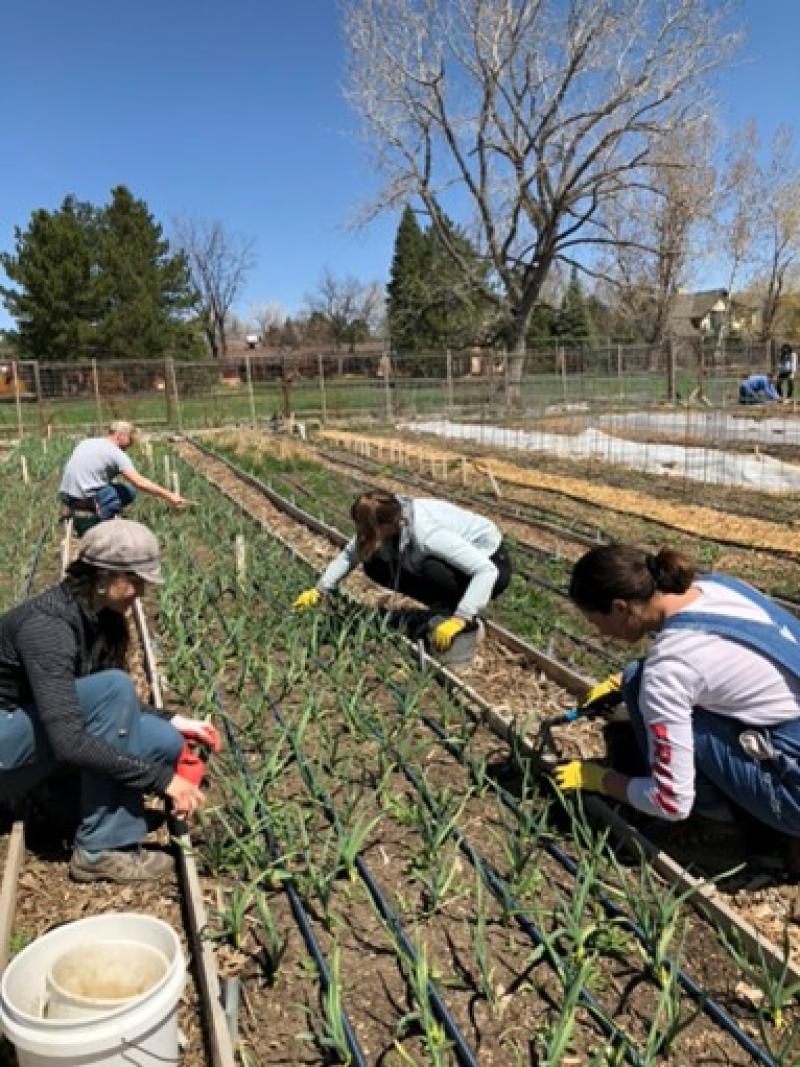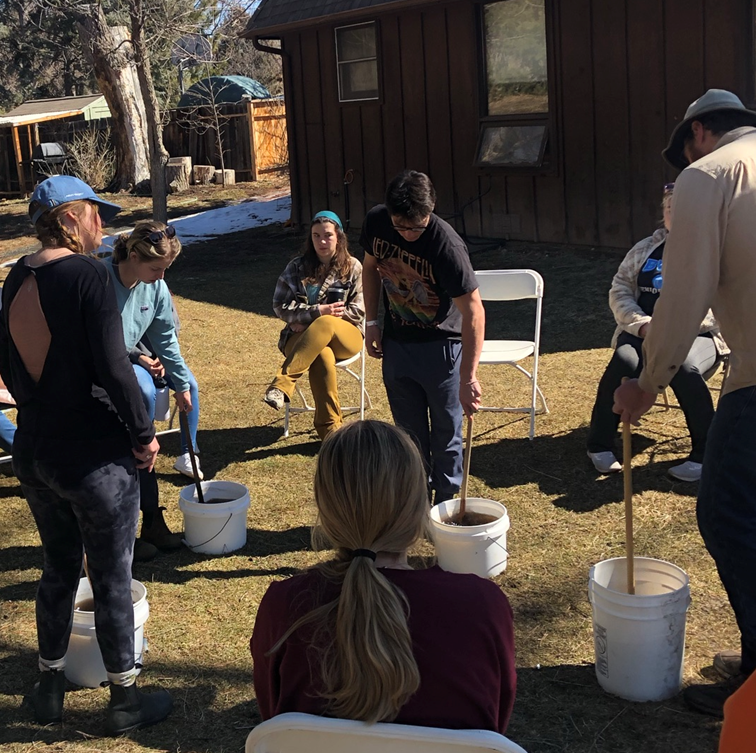A Local, Organic Approach to Writing Studies
By Veronica House, Assistant Professor | University Writing Program

Through support from CCESL, my writing students in WRIT 1122 course, Food Literacies and Public Rhetorics, and WRIT 1133, Food Matters visited a small biodynamic farm in Boulder, CO, Dharma’s Garden, to enhance their understanding of several key learning goals. In 1122 and 1133, I encourage students to consider how we situate our writing, both academic and public, in relation to the community in which we live and how writing (in a variety of genres, for a variety of audiences and purposes) helps to shape social movements, change public perceptions, and bring people together in community. Through readings on local and national food research and through students’ own experimentation with various genres and research traditions, we connect with scholarly and public conversations about food. As we study approaches to writing and research for a variety of audiences, we consider how writing can be used as a transformative force for education and change. Through field trips and guest lectures sponsored by CCESL, students learn from some of our local food innovators as they work toward their final public writing project to encourage community food literacy–these may include informational materials, feasibility reports, blog posts, newspaper articles, and videos. These texts shape how the public understands what local food is, and how to access, grow, preserve, and support it. Students use the rhetorical strategies we study to explore academic and public genres. The final writing project in my courses changes every quarter based on the suggestions of the community partners we work with. The synthesis of academic and community-based learning allows students to study complex social issues from multiple perspectives, to analyze discourses across communities, and to document their learning through informed written argument tailored to academic and public audiences.
Dharma’s Garden embodies many of the topics we study in WRIT 1122 and 1133. Founding farmers Tim Francis and Kerry Francis turned just one-half acre of this five-acre property into a productive market garden and have helped feed more than 100 families for years through a CSA of weekly vegetables during harvest season. In a neighborhood quickly gentrifying with multi-million dollar homes pushing out long-time residents, and with high property taxes and cost of living threatening the large mobile home community and affordable housing community a few streets north of the farm, Dharma’s Garden is a unique spot in the city. In 2021 after a multi-year campaign to save the farm from encroaching development, more than 600 individuals and families in the community donated to help Tim and Kerry’s non-profit successfully purchase the land they had leased for years to be held in perpetuity without risk of development. It was an example of community coming together and succeeding against seemingly insurmountable odds. Tim and Kerry needed writers to help tell the story of this success, and because we have been working together for many years on various projects, they suggested that my students help write articles for various local venues telling of this unique farm and its connection to community. To begin to understand the essence of the place, my students needed to visit.
Students realized through conversations with Kerry and Tim that these farmers have a unique model for feeding the community—a model that nurtures relationship and reciprocity. Anyone in the community can pay what they can up front in the winter to come to the farm each week during the harvest season and take as much as they need for the week from what is available. Some community members give $10 for the season, others upwards of $1,000. Kerry and Tim’s vision, as they explain on their website, is: “We are not about producing an agricultural commodity to sell; rather, we are focused on sharing an experience of tending the land with our community. In the spirit of true sharing, at our on-site weekly market, all Dharma's Garden MEMBERS are welcome to take home as many of the fruits and vegetables as will fulfill their needs. We ask only that you use what you take home with you, so that nothing goes to waste.” Theirs is a model for feeding community and connecting to land not built on extraction or domination or exclusion based on income level.
Students determined that the story they wanted to tell the public is of the farm’s growing of connection, community, and relationship. Reviving people's profound reciprocal relationship with land and food, Tim and Kerry’s pay-as-you-can and take-what-you-need model open to all shifts away from a transactional approach to a transformational one that foregrounds relationships and community. People learn on and from the land, financially or physically support the land if they can, and, each week, accept the land’s gifts in return.
When my writing students took the CCESL-sponsored field trips to Dharma’s Garden, they felt the land beneath their feet and in their hands, they discussed regenerative farming, they engaged in a planting or harvesting task that connected them, the land, and the plants, and they verbally and in written reflections made connections to the broader issues we’d studied in the course. Students then researched local media outlets through which to tell the story of the farm. They tailored their stories to each outlet understanding that after the academic year ended, I would turn over the article drafts, which they had revised multiple times, to Tim and Kerry, and that the three of us would revise them for submission this fall.
CCESL’s sponsorship of class field trips has impact beyond the field trips. It allowed students to delve into social and environmental issues as writers joining an ongoing and dynamic conversation. When they know that their writing matters, and that the community partner and I will also join in this work with them, we become co-learners and co-authors together offering food literacy through writing. Building a just and resilient local food system in the face of extractive corporate production methods and systemic inequities in who has access to healthy, culturally-sustaining foods is not something that we can achieve in a single quarter through single projects, single partners, single professors, or single academic disciplines. DU writing students helped to develop community food literacy through their projects, but their writing is not privileged; it is part of a dynamic ecology of writing. Future students and involved community members will continue to write and revise possibilities for building just food systems. To ignore this complexity in my structuring of community-based projects would be detrimental not only for our students’ learning about the networked nature of writing but also for the many, many people involved in the network of partnerships impacted by the range of student projects. My students join a vast constellation of people working and writing for change. Helping students understand and practice how writing can be used as a part of community literacy work and offering them agency to write for audiences beyond the classroom is a vital part of building community-engaged courses.
Photo credits: Veronica House

